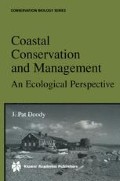Abstract
In the United States of America the Federal Fish and Wildlife Service estimate that there are approximately 6,300 non-native invasive plants and animals which pose a threat to wildlife. This chapter describes one of these species which has had a profound impact on coastal tidal areas in many parts of the world. It highlights some of the questions posed for wildlife conservation managers and amenity interests.
Access this chapter
Tax calculation will be finalised at checkout
Purchases are for personal use only
Preview
Unable to display preview. Download preview PDF.
Author information
Authors and Affiliations
Rights and permissions
Copyright information
© 2001 Springer Science+Business Media New York
About this chapter
Cite this chapter
Pat Doody, J. (2001). Spartina Anglica — A Case of Invasion. In: Coastal Conservation And Management. Conservation Biology, vol 13. Springer, Dordrecht. https://doi.org/10.1007/978-94-010-0971-3_6
Download citation
DOI: https://doi.org/10.1007/978-94-010-0971-3_6
Publisher Name: Springer, Dordrecht
Print ISBN: 978-1-4020-7248-2
Online ISBN: 978-94-010-0971-3
eBook Packages: Springer Book Archive

